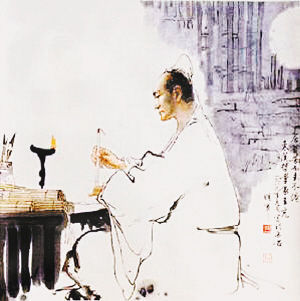(单词翻译:单击)
Wang Chong (27~97), whose courtesy name was Zhongren, was born at Shangyu (now Shangyu County, Zhejiang Province), but his ancestral home town was Yuancheng at the Wei prefecture (present-day Darning, Hebei Province).
王充(27~97),字仲任,祖籍魏郡元城(今河北大名),生在上虞(今浙江上虞)。
He led a reclusive life in the countryside most of his life, teaching and writing books.
他一生大部分时间都隐居乡里,以教书为生,以著书为业。
A prolific writer, Wang Chong summarized his thoughts into Lun Heng (Discourses Weighed in Balance), a book that included 85 chapters (84 of them survived) and took him over 30 years to finish.
著作颇多,代表作《论衡》共85篇(实存84篇),历时30多年写成,集中反映了王充的思想。

At the beginning of the Eastern Han Dynasty, superstitious ideas were rampant.
东汉前期,迷信思想泛滥。
Wang Chong was so outraged by the chaos in the academic community that in Lun Heng, he criticized such practices as the idolization of Confucius and his thoughts. Under his attack were Confucius, Mencius and other key figures of Confucianism as well as their scriptures. He further pointed out that these “deities” and their scriptures were not without flaws.
王充对思想界的黑暗混乱十分气愤,在《论衡》中,他针对神化孔子和儒家经传、经学神学化的现象展开批判,把批判锋刃直接指向孔子、孟子和五经,指出被神化的人物和经典本身并非完美无瑕,并不“神”。
Wang Chong analyzed and vigorously attacked what the theological teleologists claimed as the interaction between Heaven and humanity. Heaven, he claimed, is natural so that it is not will-driven and emotional.
王充对天人感应的神学目的论进行了有力的揭露和批判,指出天是一种物质实体,没有意志和情感,天是自然之天。
Furthermore, Wang Chong criticized the prevailing superstitious ideas and practices, especially the belief of life after death. He held that human beings are born with original vigor and human beings are unique only because they have physical bodies and consciousness.
他批判了当时流行的各种迷信思想和迷信活动,特别是对“人死为鬼”之说的批判最为彻底,他认为人禀元气而生,人之所以为人,是因为人有形体,有知觉,是形体和精神的结合体。
After death, their physical condition changes conversely: "Their bloods will exhaust; the exhaustion results in the extinction of vigor; the extinction causes the decay of the physical body, which will turn to ashes at last.”
人死以后,自身状况发生了相反的变化,“人死血脉竭,竭而精气灭,灭而形体朽,朽而成灰土。”
The illusion of ghosts and spirits are just hallucinations caused by frustration, illness and madness.
同时指出人之所以产生鬼的观念,是由于人处在困、病、狂三种状态下容易产生见鬼的幻觉。
Wang Chong also attacked the pursuit of immortality through practicing alchemy as well as other superstitious practice such as sacrifice offering and soothsaying. By exploring the root of superstition, Wang Chong helped to push the Chinese atheism to a higher level.
另外,王充还批判了“度世不死”、“修炼成仙”的思想以及祭祀、占卜等迷信活动,探讨了迷信存在的根源,批判了形形色色的方士,将无神论思想发展到更高的水平。


